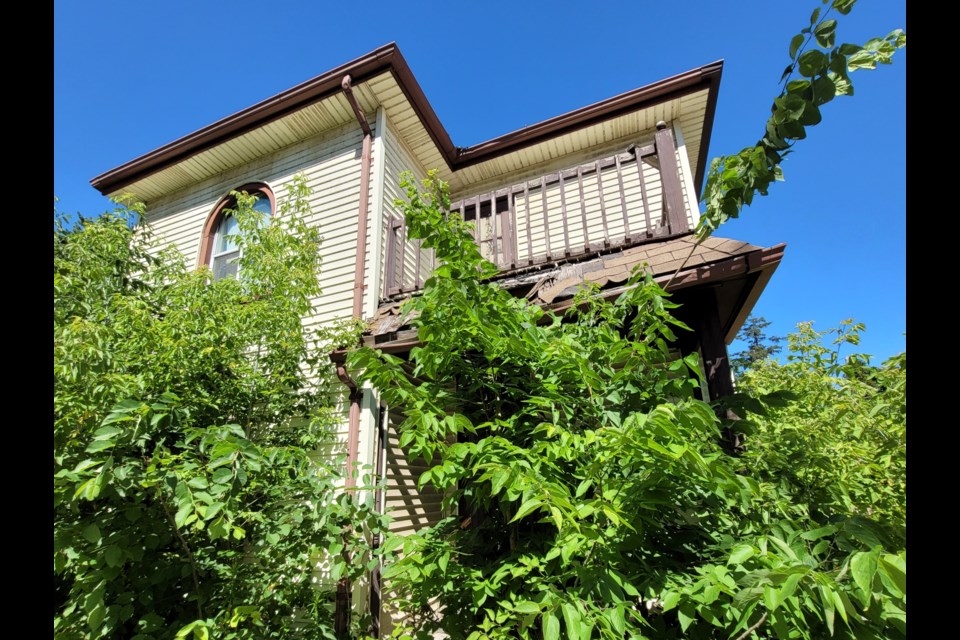Two abandoned Preston properties on the proposed Stage 2 ION route are among the first to be purchased by the Region of Waterloo and will likely be demolished soon after the sale closes on Aug. 15.
Cambridge realtor Corry Van Irsel owned the old two-storey single-detached home at 124 Eagle St. S. and 246 King St. N., the former Genesis Latin American Restaurant on the west corner of the intersection. The assessed values of the properties are $251,000 and $576,000 respectively.
Van Irsel still owns another property on the route, the home at 234 King St. E., but he said the region wasn't interested in negotiating a purchase price for it at this time.
Once the light rail transit project is approved, the plan is to bring the tracks from Highway 8, down Shantz Hill, over the Speed River and across Chopin Drive.
Functional design plates for the transit project show how the rails will cut a diagonal path through the block bordered by Eagle Street South, Queenston Road, Chopin Drive and King Street East, through properties that will either be acquired by the region through sale or expropriation.
It will then travel east, parallel to Eagle Street North before following the path of an abandoned rail line on its way to Hespeler Road and Pinebush.
Both 124 Eagle St. S. and 246 King St. N. are identified for demolition in the region's plan, bringing to mind the question of what should neighbours of abandoned properties on the route expect to happen in the meantime.
The home at 124 Eagle St. S. has been vacant and derelict for years and is boarded up to prevent people from getting inside.
The supporting joists on the second floor walk out appear to be sagging and are within a few feet of the sidewalk, presenting a potential public safety concern.
The region wouldn't comment about its condition when asked.
But at the same time the region was negotiating with Van Irsel on the sale price, the city was posting notices on the property and sending notices through the mail demanding he comply with the city's property standards bylaw.
A notice posted by the city on the front door on Aug. 8 details what needs to happen for it to be considered in compliance. The list includes a minimum standards order for the roof and porch, and cleaning up all graffiti, refuse and weeds.
The city first posted notices on the door back in 2020, in response to a complaint about the condition of the home.
However, the city's manager of municipal by-law compliance John Mattocks said that due to shifting staff priorities related to enforcing provincial orders during the pandemic, staff wasn't able to gain compliance and haven't been focused on it for two years since.
Mattocks said orders were also sent via registered mail to the property owner's address.
"If we have other contact information on file such as an email or phone number we would also utilize that," Mattocks said. "All reasonable attempts are made to make contact with the property owner."
Mattocks went on to explain that in typical situations, staff would do the work to get the property back into compliance, adding the cost to the tax roll. The owner would then be responsible for paying the costs through their taxes.
"Alternatively, we could lay charges under our property standards bylaw for failing to comply with the order."
"At this time we are reviewing the situation to assess the best approach," Mattocks said in an email to CambridgeToday on Aug. 4.
Despite bylaw's failed attempts to reach the owner, CambridgeToday was able to locate and contact Van Irsel last week by looking up the address on the tax roll and calling the number associated with it.
He picked up immediately and explained how both properties have been sold to the region.
Van Irsel said he assumed the city knew negotiations were underway and said the region would be the new owners as of Monday. He didn't understand why the city was continuing to send him notices.
"We wanted to get something done instead of sitting on it for seven years, waiting," Van Irsel said, adding it doesn't make sense to put money into repairs when it's ultimately going to be demolished.
"It's in horrible shape. There's no point in putting money into it," he said.
"I'm sure they're going to tear it down as fast as they can. That's a piece of garbage place. The homeless people just stay in there."
Van Irsel said it has taken a considerable amount of time to get appraisals on the property and suspects some of those details must have slipped through the cracks at the city.
In emailed statements to CambridgeToday, Matthew O'Neil, manager of rapid transit coordination with the region, said he can't comment on specific properties and therefore wouldn't confirm what was stated by Van Irsel about the sale or pending demolition.
Instead he said the region is committed to advancing the Stage 2 ION project, including protecting the LRT corridor for future implementation.
The extension of the ION into Cambridge hinges on the region's success at securing federal and provincial funding, something that likely won't happen until the end of the decade.
What might happen with the properties in the meantime is anyone's guess.
The region wouldn't say, apart from confirming efforts would be made to immediately deal with any issues of public safety.
"Every property the Region acquires is evaluated on a case-by-case basis as to what is done with it between acquisition and start of construction," O'Neil said.
"As a responsible and diligent property owner, the Region would seek to address any issues of public safety in a timely fashion complying with laws, regulations and orders pertaining to properties under its ownership."
Complete documents on the Stage 2 ION project can be found here, including a list of dozens of properties that will be impacted.



